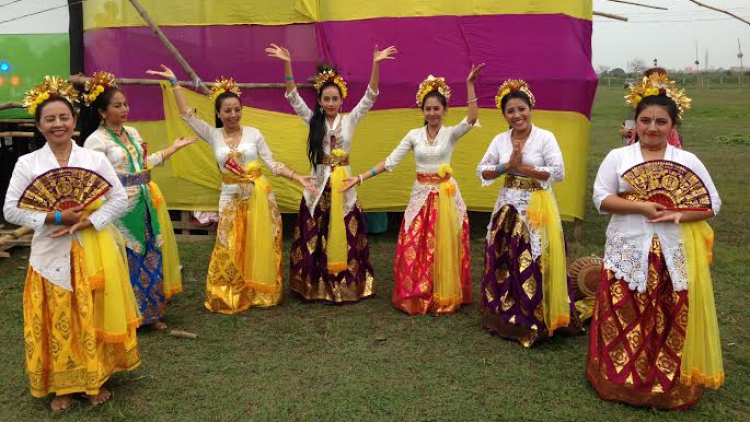ISKCON and Hinduism in Indonesia
By Ravinjay Kuckreja | Мар 21, 2014

Indonesia is renown for its beautiful islands and mesmerising landscapes. It is indeed, however, the culture and the people that enhances the Indonesian experience.
Many, many years ago, Indonesia and much of Southeast Asia today was a part of India and its Vedic heritage. Much resemblance of India and its culture is seen in Indonesia. This includes the moral structure, the language, the arts and to some extent, the religion.
Today Indonesia is the world’s largest Muslim country. Yet the locals still watch shadow puppets (or Wayang Kulit) depicting the tales of Lord Rama defeating the demon Ravana or the war between the Pandavas and the Kauravas!
One island in Indonesia still has its religious links intact. And that would be the island of Bali. “Bali” is Sanskrit for “offering”, and no name can match it better. The ‘island of the Gods’ is home to Indonesia’s indigenous Hindu population.
Hinduism in Bali is unique to Hinduism found any where else. For centuries, Hindu kingdoms has ruled over Indonesia. Vaisnavas (worshipers of Lord Vishnu/Krishna), Shaktas (worshipers of the mother goddess), Saivaites (worshipers of Lord Shiva), Tantrics and even Buddhist kingdoms ruled many parts of the country. Due to a series of events, all the above-mentioned sects, including the native animistic beliefs, merged to become Hinduism in Bali today.
Being predominantly Saivaite, Balinese Hinduism worships one supreme personality known as Sang Hyang Widhi Wasa (the ‘All in One’ God) and identifies Him mainly with Lord Shiva. The Balinese make daily offerings for the Supreme Lord, the different demigods or ‘Bataras’, the ghosts and demons or ‘Bhuta kala’ and the ancestors or ‘leluhur’. Respecting the nature that surrounds them, they develop a unique culture and art that is utilised to praise God.
As devotees of ISKCON (or in Indonesia, SAKKHI [Sampradaya Kesadaran Krishna Indonesia]) we are directly under the Hindu Dharma Parishad of Indonesia. As Indonesia only recognises six official religions, all religious organisations has to be linked to either one of them, or create a new faith without a scriptural basis.
To clarify our relationship with Hinduism in Bali, the International Communications Department of ISKCON in Indonesia has made the following statement, with the approval of the ISKCON Ministry of Communications and the Regional Governing Body Commission Secretary:
- ¨ISKCON respects the Hindu Balinese religion and incorporates its daily rituals and traditional clothing into our daily practices (on a national level). In Bhakti-yoga we believe in utilising anything we have in the service of the Absolute. With such a principal in mind, we adore the Balinese culture and apply it.
- Both nationally and internationally, ISKCON recognises the unique, exotic, traditional and spiritual art and culture of Hindu in Bali and uses it to glorify the Supreme Lord. The same purpose it is intended to be used for.
- ISKCON respects daily offerings of flower and incense sticks (known as canang sari) to the seen and unseen (sekala и niskala). We understand the elevated culture of Hindu Bali to be from the Vedas and its application according to time, place and circumstance (desa-kala-patra).
- ISKCON devotees who are previously from a Hindu lineage are encouraged to participate in family events, in respecting their ancestors, in helping their local temple and in performing the different sacrifices meant for human beings (yadnya).
- ISKCON pushes forward the study of the Vedas, primarily the Bhagavad-Gita and the Bhagavata Purana. It focuses on educating the Hindu mass on the path of Bhakti, as mentioned in the Vedic texts. This is done through the distribution of literature, on a personal level and in lectures or talks (dharma vacana).
- ISKCON respects the unique and cultural religion of Hinduism in Bali and seeks to develop relations with other sampradayas/schools of thoughts within the religion.
ISKCON is a home for people of many different cultures. Dovetailing them in the service of Sri Caitanya and Srila Prabhupada is an offering of devotion. This year 75 devotees from Indonesia visited Mayapur, the birthplace of Lord Caitanya and ISKCON’s headquarters, bringing with them the exotic culture of Bali.
The devotees performed a Balinese dance, with Balinese musical instruments, to the Hare Krishna Maha-mantra. The devotees had much pleasure performing for the opening of the 25th year of the Navadvipa Mandala Parikrama and performing a collaboration with Prahlad Nrsimha das and Sri Nama Vanamali Krishna das for the Kirtan Mela 2014, a five day Kirtan event. The Balinese dancers also led the path for the elephant procession of Sri Sri Radha Madhava.
In Vrindavan, the birthplace of Lord Krishna, the Balinese devotees also led a Balinese style kirtan at ISKCON’s Krishna Balarama Mandir, accompanied with exotic gongs.
The International Communications Department of ISKCON in Indonesia hopes to build better relations with the Hindu community and showcase the unique culture of Hinduism in Bali through Krishna conscious activities.
To know more about ISKCON in Indonesia, visit iskconid.org















